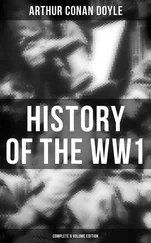J. Fortescue - History of the British Army (Vol.1&2)
Здесь есть возможность читать онлайн «J. Fortescue - History of the British Army (Vol.1&2)» — ознакомительный отрывок электронной книги совершенно бесплатно, а после прочтения отрывка купить полную версию. В некоторых случаях можно слушать аудио, скачать через торрент в формате fb2 и присутствует краткое содержание. Жанр: unrecognised, на английском языке. Описание произведения, (предисловие) а так же отзывы посетителей доступны на портале библиотеки ЛибКат.
- Название:History of the British Army (Vol.1&2)
- Автор:
- Жанр:
- Год:неизвестен
- ISBN:нет данных
- Рейтинг книги:4 / 5. Голосов: 1
-
Избранное:Добавить в избранное
- Отзывы:
-
Ваша оценка:
- 80
- 1
- 2
- 3
- 4
- 5
History of the British Army (Vol.1&2): краткое содержание, описание и аннотация
Предлагаем к чтению аннотацию, описание, краткое содержание или предисловие (зависит от того, что написал сам автор книги «History of the British Army (Vol.1&2)»). Если вы не нашли необходимую информацию о книге — напишите в комментариях, мы постараемся отыскать её.
History of the British Army (Vol.1&2) — читать онлайн ознакомительный отрывок
Ниже представлен текст книги, разбитый по страницам. Система сохранения места последней прочитанной страницы, позволяет с удобством читать онлайн бесплатно книгу «History of the British Army (Vol.1&2)», без необходимости каждый раз заново искать на чём Вы остановились. Поставьте закладку, и сможете в любой момент перейти на страницу, на которой закончили чтение.
Интервал:
Закладка:
1601.
July 9.
Next year the Archduke Albert sought revenge for his defeat by the investment of the one stronghold of the United Provinces in Flanders, the little fortified fishing-town of Ostend. The garrison had made itself so obnoxious to the surrounding country that the States of Flanders petitioned the Archduke to stamp out the pestilent little fortress once for all; and hence it was that in the following years the principal operations grouped themselves around the siege. The Archduke's army consisted of twenty thousand men with fifty siege-guns; the garrison of barely six thousand men, half English and half Dutch, of which fifteen hundred English, all dressed in red cassocks, were a reinforcement just imported from across the sea. Francis Vere was in supreme command, and his brother Horace commanded a regiment under him.
I shall not weary the reader with details of Vere's skill and resource in improving the defences of the town, or of the incessant encounters that took place during the first weeks of the siege. The Spanish fire was so hot and the losses of the besieged so heavy that the garrison was fairly worn out with the work. Vere was dangerously wounded in the head within the first three weeks and compelled to throw up the command until restored to health, and at the close of the first month hardly a red cassock of the fifteen hundred was to be seen, every man being wounded or dead. Nevertheless, the sea being always open to the besieged, fresh men and supplies could always be poured into the town to repair the waste. Two thousand English, for a wonder well equipped and apparelled, were the first to arrive, and were followed by a contingent, of French and Scots. They too went down with terrible rapidity. The town was but five hundred yards across, and the Spanish batteries were built within musket-shot of the defences. Hardly a house was left standing, and the garrison was compelled to burrow underground as the only refuge from the incessant rain of missiles. The winter set in with exceptional rigour, the defenders dwindled to a bare nine hundred effective men, and at Christmas Vere, in the face of foul winds and failing supplies, was compelled to resort to a feigned parley to gain time. By a fortunate change of wind four hundred men were able to enter the harbour and recruit the exhausted garrison.
1602.
So far the Spaniards had fired one hundred and sixty-three thousand cannon-shot into the town, and they now decided on a general assault. On the 7th of January Vere received intelligence of the coming attack, and, though his force was far too weak to defend the full extent of his works, made every preparation to repel it. Firkins of ashes, barrels bristling with tenterhooks, stones, hoops, brickbats, clubs, what not, were stored on the ramparts, and at high tide the water was dammed up into the ditch. At nightfall the Spanish columns fell on the devoted town at all points. They were met by a shower of every description of missile; flaming hoops were cast round their necks, ashes flung in their eyes, brickbats hurled in their faces; and storm as they might they could gain no footing. Thrice they returned to the assault, and thrice they were beaten back, and at last they retired, sullen and furious, for the tide was rising, and on one side they could advance to the town only by a passage which was not fordable at high water. Vere opened the sluices of the ditch as they retreated, and the rush of water swept scores if not hundreds of them out to sea. The Spanish loss was two thousand men; that of the garrison did not exceed one hundred and thirty.
1603–1604.
I shall not further follow this memorable siege. Vere and his brother Horace left the town worn almost to death in March 1602, but still the defence was maintained. Reinforcements from England came in by hundreds and by thousands. Rogues, vagabonds, idle, dissolute, and masterless persons were impressed impartially together with men of honesty and reputation, clapped into red or blue cassocks and shipped across to Ostend. Volunteers of noble and of humble birth, some in search of instruction, some with a thirst for excitement, hurried likewise to the siege, and Ostend became one of the sights of Europe. Governor after governor, gallant Dutchmen all of them, came to take command. Three of them were killed outright, but still the defence continued, until at last on the 13th of September 1604 the heap of ruins which marked the site of Ostend was surrendered into the generous hands of Spinola. The siege had lasted three years and ten weeks, and had cost the lives of one hundred and twenty thousand men.
Before the town fell the campaigns of Francis Vere were ended. In 1602 he accompanied Maurice to the siege of Grave, where he was once more dangerously wounded, and in the summer of 1604 he retired from the service of the States, from whom he deservedly received a pension for his life. In the very same year King James the First made a treaty with the Archdukes of the Spanish Netherlands, which left the Dutch patriots henceforth to fight their battles by themselves; but nations like the English and Scotch are not bound by the decisions of such a creature as James. The British troops not only remained in the service of the State but grew and multiplied exceedingly, and Francis Vere, who had made their service honourable and given their efforts distinction, could feel that his work was well done. A few short years of rest closed a life that was shortened by hardship and wounds; and on the 28th of August, 1609, within four months of the signing of the truce which gave breathing time to the exhausted combatants of the Dutch war, the old soldier died peacefully in his house in London. His tomb in Westminster Abbey is admired by thousands who know not one of his actions, but surely it is no derogation to art to remember that the recumbent marble effigy, and the four noble figures that kneel around it are those not of conventional heroes, but of honest English fighting men, typical of many thousands who perished in the cause of Dutch freedom and lie buried and forgotten in the blood-stained soil of the Netherlands.
1619.
The twelve years' truce gave the English regiments a rest which, though not wholly unbroken, left some of the more daring spirits free for other adventure. The cause of the Elector Frederick, a prince less interesting to the English as the Winter King than as the husband of their favourite Princess Elizabeth, called Horace Vere and many another gallant gentleman with four thousand good soldiers into the Palatinate, where however their bravery could not avail to save them from inevitable failure. King James of course had no part in the venture; so far from moving a finger in aid of the Protestant cause in Germany, he even conspired secretly with Spain for a partition of the Netherlands, which was to be effected by the English troops in the Dutch service, the very men who had made the cause of the United Provinces their own and had carried it through the perils of Nieuport and Ostend. It is hardly surprising that such a man should, not indeed without searching of heart but without stirring a hand, have suffered Germany to drift into the Thirty Years War.
1621.
1624.
1625–1637.
The lapse of the twelve years' truce found a large contingent of English under the command of Sir Edward Cecil attached to the army of Prince Maurice; and three years later the final breach of England with Spain increased its number from six to twelve thousand, and in 1625 even to seventeen thousand men. It would be tedious to follow them through the operations of the ensuing campaigns; it must suffice to call attention to the rise of men who were to become famous in later days and thus bridge over by a few stepping-stones the connection of the British army with the old Dutch schools of war. The first names are those of Philip Skippon, whom we find wounded before Breda in 1625, and of Captain John Cromwell, a kinsman of the great Oliver, who was also wounded in the same action. Coming next to the siege of Bois le Duc in 1629 we find the list far longer—Lord Doncaster, Lord Fielding, who trailed a pike in Cecil's regiment, Lord Craven, a Luttrell, a Bridgeman, a Basset, a Throgmorton, a Fleetwood, a Lambert, a second Cromwell, Thomas Fairfax, Philip Skippon, Jacob Astley, Thomas Culpeper, the veterans Balfour and Sandilands from north of the Tweed, and many more. Lastly, at the siege of Breda in 1637 we see Prince Rupert and Prince Maurice, sons of the Winter King, as forward in the trenches as any needy cadet could be, working side by side with Philip Skippon, Lord Warwick, and George Goring. Of these Skippon and Goring divided the honours of the siege. Skippon at a post of extreme danger drove off two hundred Spaniards at push of pike with thirty English; he was struck by five bullets on helmet and corselet and at last shot through the neck, but he merely sat down for ten minutes and returned to his work until recalled by the Prince of Orange. Goring in the extreme advanced sap paid extra wages from his own pocket to any who would work with him, and remained there while two-and-twenty men were shot down round him, until at last he was compelled to retire by a bullet in the ankle. Meanwhile fresh volunteers kept pouring in—Herbert, son of Lord Herbert of Cherbury, Sir Faithful Fortescue of the King's cavalry in Ireland, Sir Charles Slingsby, with many more, and lastly Captain George Monk of Potheridge in Devon, one day to be the first colonel of the Coldstream Guards, and even now distinguished by peculiar bravery.
Читать дальшеИнтервал:
Закладка:
Похожие книги на «History of the British Army (Vol.1&2)»
Представляем Вашему вниманию похожие книги на «History of the British Army (Vol.1&2)» списком для выбора. Мы отобрали схожую по названию и смыслу литературу в надежде предоставить читателям больше вариантов отыскать новые, интересные, ещё непрочитанные произведения.
Обсуждение, отзывы о книге «History of the British Army (Vol.1&2)» и просто собственные мнения читателей. Оставьте ваши комментарии, напишите, что Вы думаете о произведении, его смысле или главных героях. Укажите что конкретно понравилось, а что нет, и почему Вы так считаете.












